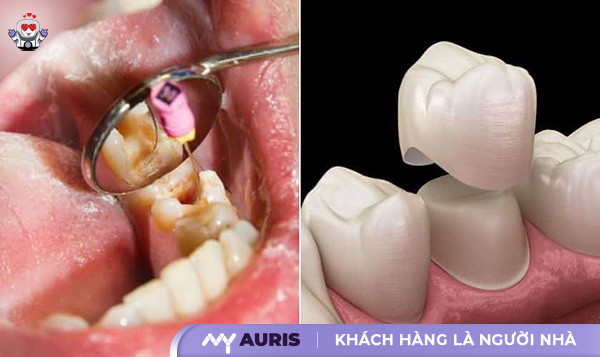“Should teeth that have undergone root canal treatment be crowned?” – The answer is YES! In reality, at My Auris Dental Clinic, many cases where root canal treated teeth were not crowned resulted in fractured teeth that had to be extracted. Let’s delve into the reasons why a tooth should be crowned after root canal treatment and the standard medical procedure for crowning a root canal treated tooth.
How Much Does Root Canal Treatment and Dental Crowning Cost?
The current cost of root canal treatment and dental crowning varies depending on several factors such as the position of the tooth needing root canal treatment, the extent of pulp inflammation, the type of porcelain crown chosen, and the price list of each dental clinic. Typically, the price for root canal treatment (endodontic treatment) ranges from 250,000 – 2,000,000 VND/tooth, while the cost for a porcelain crown after root canal treatment ranges from 1,000,000 – 14,000,000 VND/tooth.
Detailed root canal treatment prices by case
- Price for incisor root canal (1 canal): 600,000 – 800,000 VND/tooth
- Price for premolar root canal (2 canals): 800,000 – 1,000,000 VND/tooth
- Price for molar root canal (3–4 canals): 1,000,000 – 1,200,000 VND/tooth
- Price for retreatment of root canal: 1,500,000 – 2,000,000 VND/tooth
Here is the detailed dental price list at My Auris Dental Clinic:
| Root Canal Treatment (Endodontics) | Cost |
| Deciduous tooth root canal treatment | 250,000 – 500,000 VND/tooth |
| Incisor, canine root canal treatment | 600,000 VND/tooth |
| Premolar root canal treatment | 800,000 VND/tooth |
| Mandibular molar root canal treatment | 1,000,000 VND/tooth |
| Maxillary molar root canal treatment | 1,200,000 VND/tooth |
| Incisor, canine, premolar root canal retreatment | 1,500,000 VND/tooth |
| Molar root canal retreatment | 2,000,000 VND/tooth |
The cost of dental crowns after root canal treatment largely depends on the porcelain material. There are two main groups:
- Cost for metal-porcelain crowns: 1,000,000 – 3,500,000 VND/tooth
- Price for all-ceramic crowns: 4,500,000 – 14,000,000 VND/tooth
| Crown Type | Cost |
| Zirconia All-Ceramic Crown (Germany) | ~ 1,500,000 – 3,000,000 VND/tooth
(Combo Price – 5-year warranty) |
| Vita USA Ceramic Crown | ~ 2,500,000 – 4,500,000 VND/tooth
(Combo Price – 8-year warranty) |
| Cercon HT/Nacera Ceramic Crown | ~ 3,500,000 – 6,000,000 VND/tooth
(Combo Price – 10 to 15-year warranty) |
| Lava Ceramic Crown | ~ 5,500,000 – 9,000,000 VND/tooth
(Combo Price – 20-year warranty) |
| Emax Press Ceramic Crown | ~ 6,000,000 – 12,000,000 VND/tooth
(Combo Price – 25-year warranty) |
| Amira (Lisi) Crystal Ceramic Crown | ~ 8,000,000 – 14,000,000 VND/tooth
(Combo Price – 30-year warranty) |
| Lucy Crystal Ceramic Crown | ~ 10,000,000 – 16,000,000 VND/tooth
(Combo Price – Lifetime warranty) |
| Irisa Orodent High Translucent Crystal Ceramic Crown | ~ 12,000,000 – 20,000,000 VND/tooth
(Combo Price – Lifetime warranty) |
| Endora Diamond Crystal Ceramic Crown | ~ 15,000,000 – 30,000,000 VND/tooth
(Combo Price – Lifetime warranty) |
Price list for porcelain crowns after root canal treatment at My Auris Dental Clinic
For those needing 16–20 all-ceramic restorations, you will receive a 10% to 20% discount on the cost of all premium all-ceramic crown lines. This solution both enhances chewing function and comprehensively improves aesthetics.

Why is it necessary to crown a tooth after root canal treatment?
Crowning a tooth after root canal treatment is an indispensable step in modern dental care, recommended by dentists to optimally protect and restore the tooth. Here are compelling reasons you should consider:
- Protects teeth from fractures
A tooth after root canal treatment is no longer nourished by blood vessels and nerves, becoming dry, brittle, losing its elasticity, and very prone to fracturing. Crowning the tooth creates a strong protective shell around the natural tooth structure, preventing chips or fractures during daily chewing.
- Restores chewing function
Even if filled, a root canal treated tooth is weaker than normal and has poor load-bearing capacity, making it prone to cracking, fracturing, or rapid wear. Thanks to the high hardness and durability of porcelain crowns, chewing becomes comfortable, significantly improving the quality of life.
- Prevents re-infection
After treatment, even though the root canal has been cleaned and tightly sealed, conventional filling materials do not guarantee an absolute seal. Over time, fillings can loosen, wear down, or fall out, allowing bacteria to re-enter and cause recurrent infection. Crowning effectively seals the entire tooth crown, preventing re-infection and helping to maintain long-term root canal treatment results.
- Ensures aesthetic appeal
Tooth discoloration, turning gray or black after root canal treatment, is common due to loss of nourishment and effects from filling materials. Using a porcelain crown with a natural shape, natural size, natural color, and shiny surface significantly improves aesthetics, especially for front teeth or easily visible areas.
- Increases tooth lifespan
Crowning after root canal treatment not only extends the tooth’s lifespan but also helps the tooth to remain in the arch long-term. By limiting fractures and recurrent inflammation, you avoid the risk of premature tooth extraction, preserving the structure and function of your oral cavity.
In summary, if you are wondering whether to crown a tooth after root canal treatment, the answer is yes. This is a comprehensive solution recommended by dentists to protect teeth from damage, restore function, and maintain long-term aesthetics.
What is the standard medical procedure for root canal treatment?
- Step 1: General examination and X-ray imaging
Before starting treatment, the dentist will conduct a general examination of the tooth’s condition, combined with an X-ray, to assess the extent of pulp inflammation, determine the shape and number of root canals, and examine the surrounding tooth structures. This information helps accurately identify the inflammatory condition and plan appropriate treatment.
- Step 2: Oral cavity disinfection and anesthesia
The dentist performs thorough oral hygiene to prevent the risk of infection. Afterward, local anesthetic will be injected into the gum area around the tooth requiring treatment, ensuring the patient feels no pain throughout the root canal procedure.
- Step 3: Isolation with a rubber dam
Once the anesthetic takes effect, the dentist uses a rubber dam to isolate the tooth from saliva and the oral environment, keeping the treatment area dry and effectively preventing contamination.
- Step 4: Root canal preparation
Using a specialized dental drill, the dentist will access the pulp chamber. Then, specialized endodontic instruments are used to remove all pulp tissue from the pulp chamber and root canals. During this process, the dentist continuously irrigates the root canals with antiseptic solutions such as Sodium Hypochlorite, Chlorhexidine, or EDTA to completely remove infected or necrotic pulp tissue.
- Step 5: Root canal obturation
Once the root canal system has been thoroughly cleaned, shaped, and dried according to proper technique, the dentist will tightly seal the canals with specialized materials such as Gutta-percha and Sealer. This fills the internal spaces, prevents bacterial invasion, and avoids the risk of future re-infection.

Is crowning a tooth after root canal treatment painful?
The answer is: NO PAIN. Throughout the process of crowning a tooth after root canal treatment, the patient will receive local anesthesia, ensuring no pain is felt. After treatment, a mild sensitivity might occur for the first 1–2 days, but this is well within the body’s tolerance and will quickly subside.
At My Auris Dental Clinic, all procedures are performed by specialized dentists with gentle, precise techniques, ensuring patients feel comfortable throughout the treatment process.
If you are looking for a reliable clinic to treat dental issues ranging from simple to complex, My Auris Dental Clinic is an ideal choice. With over 10 years of experience and a modern equipment system, My Auris ensures accurate diagnosis, safe, pain-free treatment with no complications – providing absolute satisfaction and peace of mind for patients.
How long does a root canal treated tooth with a crown last?
The longevity of a root canal treated tooth with a crown depends on several important factors, such as:
Was the initial condition of the pulp inflammation severe or mild?
Was the dentist’s technique performed correctly and to standard?
Do you maintain good oral hygiene habits after crowning?
Under ideal conditions, a root canal treated tooth with a crown can last stably for 10–25 years. This is achievable if the tooth is carefully maintained and the procedure is performed correctly.
What is certain is that a tooth crowned after root canal treatment will be much more durable than one that only received root canal treatment without any restoration. Beyond increasing durability, crowning also provides aesthetic benefits and helps address issues like fractures, chips, or discoloration after root canal treatment.
So, how long can your root canal treated and crowned tooth last? Let My Auris Dental Clinic accompany you! Our team of dentists will provide specific consultations based on each patient’s oral health condition, ensuring long-term effectiveness and safety.





